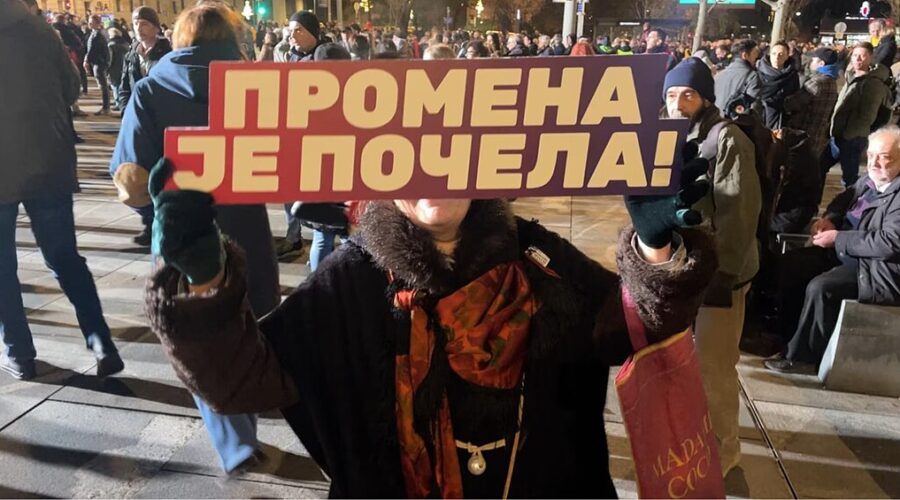Serbs love elections. There have been three elections in Serbia in the past three years, and every time the turnout was relatively high. But absolutely nothing has changed.
Since 1990, which is when a multi-party system was reintroduced, the southeastern European country has held 14 elections, including 10 snap votes. On November 1, President Aleksandar Vucic ceremonially signed a decree dissolving the National Assembly and announced the extraordinary parliamentary election. It was held on December 17 and coincided with local votes in 65 municipalities, including the capital Belgrade.
Although opinion polls suggested that the ruling Serbian Progressive Party’s (SNS) support was significantly below its 2022 election results – which is when the SNS-led coalition won 44% of the vote – according to a near-final count, this time the SNS-dominated Serbia Must Not Stop coalition won 3% more votes than it did last year.
Results in Belgrade, however, are tied between the populist Serbia Must Not Stop and the pro-Western Serbia Against Violence coalitions. The right-wing nationalist opposition remains numerically weak and fragmented, not only in the Serbian capital but in the rest of the country as well.
The Serbian Progressive Party and its allies will undoubtedly form a new government, and continue implementing the same policy they introduced back in 2012, which is when they first came to power. In other words, the country will remain in the European Union’s “eternal waiting room”, with very little chances to join the bloc anytime soon, if at all.
At the same time, Serbia will almost certainly be forced to implement the EU’s proposal on normalization of relations between Belgrade and Pristina. Serbian President Aleksandar Vucic has already agreed to put into effect the deal, despite the fact that it represents Serbia’s implicit recognition of Kosovo – the Serbian breakaway province that unilaterally declared independence in 2008.
Although the EU firmly supports Ukraine’s territorial integrity, and has recently agreed to open membership talks with Kyiv, the bloc is urging Serbia to de facto recognize secession of its own territory. The Balkan nation has been a candidate to join the European Union for more than a decade, but Belgrade’s recognition of Kosovo is the EU’s key condition for Serbia to advance its application.
Despite the fact that the vast majority of the population firmly rejects a potential recognition of Kosovo, it is entirely possible that the new SNS-dominated government will implement the EU’s proposal and portray it as a “Serbian victory”. Vucic, who is the de facto leader of the SNS, is quite aware that such an outcome is unlikely to have an impact on his reign. The opposition – both nationalist and pro-Western parties – proved to be incompetent and politically impotent. As such, it does not pose a serious threat for Vucic and the SNS.
Following two mass shootings in May, the opposition held series of large-scale protests all over the country. Dozens, if not hundreds of thousands of people were on the streets, but the protests eventually died down. Moreover, Serbian voters seem to have rewarded the ruling SNS in the election, even though the opposition sees the government as the most responsible for the tragedy.
Voters have also rewarded the SNS for the debacle the Serbian state suffered in Kosovo on September 24, when around 30 armed Serbs clashed with the Kosovo police in the Banjska village. As a result, the ethnic Albanian-dominated police forces established full control over northern Kosovo, where ethnic Serbs make up the majority of the population.
#BREAKING #Serbia #Belgrade Footage from the ongoing protests in Belgrade.
Protesters are demanding that the local election commission annul the voting results, and they declined to vacate the commission building until their demands are addressed.
Footage: RIA pic.twitter.com/NmVU6O4na1— The National Independent (@NationalIndNews) December 18, 2023
Thus, despite new protests that the opposition launched on December 18 citing alleged irregularities in the Belgrade election, the SNS is expected to continue ruling not only the Serbian capital, but also the rest of the country. In Belgrade, a controversial figure, Dr Branimir Nestorovic, is set to be a kingmaker, given that his right-wing populist electoral list entitled We – Voice from the People won 4.8% of the vote, and a new local government cannot be formed without this group.
During the COVID-19 pandemic, Nestorovic, who is a pediatric pulmonologist, became a hero to anti-vaxxers. He is well-known for describing COVID as the “funniest virus in the history of mankind”. That statement was the beginning of his political career. He is often portrayed as a flat earther who believes that blue-eyed humans are descendants of aliens who were born on Mars.
Still, despite having such exotic views, Nestorovic and the We – Voice from the People political organization seem to have become a very important actor in the Serbian political arena. That, however, does not mean that they will be in a position to participate in a new Serbian government, or to have an influence on the country’s geopolitical course.
Given that Vucic is firmly backed by the United States, the European Union, Russia, and China, and is also supported by large parts of Serbian population, he and the SNS will almost certainly remain in power at least until 2027, which is when the country is scheduled to have both presidential and parliamentary elections.
Image: Voice of America (Stefan Miljuš)

